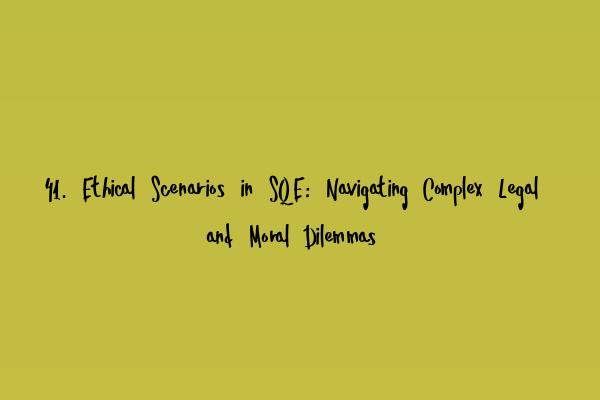41. Ethical Scenarios in SQE: Navigating Complex Legal and Moral Dilemmas
As aspiring solicitors, one of the essential skills we must develop is the ability to navigate complex legal and moral dilemmas ethically. The Solicitors Qualifying Examination (SQE) is designed to assess our capability in handling such scenarios. In this blog post, we will explore some ethical scenarios that frequently appear in the SQE and discuss strategies for effectively addressing them.
The Importance of Ethical Considerations
Ethics play a crucial role in the legal profession. Solicitors are entrusted with safeguarding the rule of law and serving the best interests of their clients while also upholding the principles of justice and fairness. Hence, it is imperative for future solicitors to demonstrate a strong ethical foundation.
During the SQE, you may encounter several ethical scenarios that test your ability to make sound judgments. These scenarios assess your understanding of the Solicitors Regulation Authority (SRA) Standards and Regulations, as well as your knowledge of professional conduct rules and ethical principles.
Common Ethical Scenarios in SQE
Let’s explore some common ethical scenarios that you may come across during the SQE:
1. Client Confidentiality
You may be presented with a situation where your client wants to disclose confidential information that could potentially harm others. How would you navigate this dilemma while maintaining trust and confidentiality?
2. Conflict of Interest
Imagine having multiple clients with conflicting interests. How would you ensure fairness and avoid favoritism, balancing the duty owed to each client?
3. Misconduct by a Colleague
In this scenario, you may witness a colleague engaging in unethical behavior. How would you handle the situation, considering your duty to report such misconduct?
4. Access to Justice
Another common scenario involves balancing the need for access to justice with limited resources. How would you address this challenge, considering the ethical obligations to provide quality legal services to all clients?
Strategies for Navigating Ethical Scenarios in SQE
To effectively address ethical scenarios in the SQE, consider the following strategies:
1. Familiarize Yourself with the SRA Standards and Regulations
Develop a comprehensive understanding of the SRA Standards and Regulations. These guidelines provide a framework for ethical decision-making and professional conduct.
Further reading: Solicitors Qualifying Examination (SQE): Your Gateway to Legal Practice
2. Apply Legal Knowledge and Ethical Principles
When faced with an ethical scenario, consider both legal knowledge and ethical principles. Apply relevant legal rules, obligations, and ethical considerations to make an informed decision.
3. Consider the Consequences
Think about the potential consequences of your actions or decisions. Consider the impact on clients, stakeholders, and the overall legal profession. Balancing the interests of all parties involved is crucial.
4. Seek Advice and Guidance
If in doubt, seek advice and guidance from experienced professionals. Discussing the scenario with mentors, tutors, or legal practitioners can provide valuable insights and different perspectives.
Further reading: SQE Strategies: Proven Tactics to Ace the Solicitors Qualifying Examination
5. Reflect on Real-Life Case Studies
Gain practical insights by analyzing real-life case studies. This exercise allows you to apply legal and ethical principles to real-world scenarios, enhancing your problem-solving abilities.
Further reading: SQE Case Studies: Applying Knowledge in Real-Life Scenarios
6. Practice Time Management
Develop efficient time management skills to ensure you have enough time to analyze and resolve ethical scenarios within the given timeframe. Effective time management reduces stress and allows for more thoughtful decision-making.
Further reading: Mastering Time Management in SQE: Strategies for Efficient Exam Completion
7. Learn from Mock Exams
Utilize mock exams to identify areas of improvement in addressing ethical scenarios. Analyze your results, seek feedback, and work on refining your approach to enhance your ethical decision-making skills.
Further reading: Analyzing Mock Results for SQE: Identifying Areas of Improvement
Conclusion
Developing the ability to navigate complex legal and moral dilemmas is essential for success in the legal profession. The SQE assesses your ethical decision-making skills, ensuring that you are capable of upholding professional standards.
By familiarizing yourself with the SRA Standards and Regulations, applying legal knowledge and ethical principles, seeking guidance, and reflecting on real-life case studies, you can confidently approach ethical scenarios in the SQE and demonstrate your ethical competence as a future solicitor.
